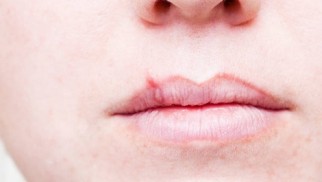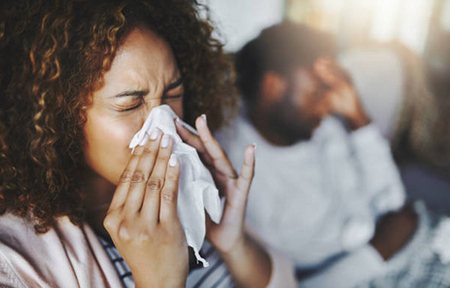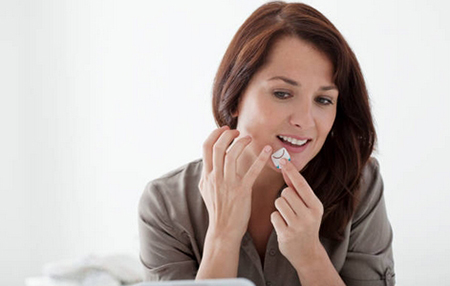What causes cold sores and how are they treated?


Despite the name, cold sores have nothing to do with a common cold. Most likely, the name is similar because it can occur during flu or a common cold. But it isn't caused directly by these diseases. Cold sores appear because all body immune system’s powers are aimed at eliminating flu and cold and the suppression of the virus that causes lip sores isn’t sufficient. Besides, cold sores commonly have a seasonal character that coincides with common cold and flu season. So what causes cold sores?
Cold sores more correctly called oral herpes is provoked by the virus called herpes simplex of type I or II. It is the same virus that triggers genital herpes. It is a very widespread virus. It estimated that it is present in 75-90% of people in the world. However, many of the carriers do not even know they have the virus as it is latent, i.e. doesn’t manifest when a person has a good immunity. Moreover, it is possible to transmit the virus to another person even if you have no symptoms but the likelihood of transmission is higher when the virus causes a flare-up.
Short information about lip herpes
Are cold sores contagious?
Yes. Herpes in general contagious but it is especially likely to be transmitted when a person has a flare-up, i.e. fluid-filled rash that when breaks result in ulcers. The ways of transmission are:
- Kissing;
- Touching the affected skin;
- Touching of unaffected skin during a flare-up (less likely);
- Drinking or eating from the same dishes;
- Using the same towels;
- Having an unprotected sexual intercourse with an infected person;
- Having done any procedures (for instance, tattoo, ear piercing, injections, etc.) in unsterile conditions, and so on.
- Through the same inhaled air in a confined space (less likely).
Most of the time, the virus is contracted in childhood. It may not manifest right away but over time almost everyone develops lip herpes from time to time.
A person can even spread the pathogen to the other sites of the body. For instance, lip herpes can be transmitted to genitals, eyes, and vice versa if a person touches them without washing hands.
If a person has weak immunity, herpes can flare-up multiple times a year in different parts of the body. Besides, in poor hygiene, it can be spread to the other parts of the body and cause such complications as:
- Eye herpes;
- Infection of the nervous system with herpes;
- Autoimmune conditions (i.e. conditions in which proper immunity acts against the body);
- Benign or cancerous neoplasms.
It is important to understand that the virus is never completely eliminated from the body. Antiviral medications suppress the replication of the virus so flare-ups are shorter and occur less frequently but drugs do not completely kill the virus.
What triggers herpes/cold sores occurrence?

As we have already discussed, herpes can be present in the body without any manifestations but a lowering in immune protection triggers its flare-up. The factors that can cause it are:
- Pregnancy;
- Chronic stress;
- Chronic tiredness due to insufficient sleep;
- Vitamins deficiency;
- Unhealthy or insufficient nutrition;
- Injuries (for instance, chapped lips);
- Long exposure to direct sun rays;
- Alcohol abuse;
- Chronic or acute infection;
- Use of medicines that suppress immunity (for instance, after an organ transplant, cancer medicines, long-term use of antibiotics, glucocorticoids, etc.);
- Overcooling;
- HIV and AIDS, and others.
How is labial herpes/cold sore treated?

Like other types of herpes, a flare-up of lip herpes can fade over time without any treatment. However, the use of antiviral medicines can significantly shorten the time of the presence of the symptoms.
If you rarely have herpes, antiviral topical products can be sufficient for you. You can choose from Acyclovir or Valacyclovir ointments. The ointments are applied to the affected area 4-6 times a day starting from the onset of the first symptoms, i.e. mild tingling or burning on the lips. If the lesion is spread on a bigger area, the 1.25 cm strip of ointment is applied to 25 square centimeters area.
In the case of relapsing infection, ointment can be used even when the virus is latent, i.e. no visual manifestations of the virus, or as soon as the first tingling-like sensation occurs. The treatment course duration is no less than 5 and no more than 10 days.
In recurring infection, you can also use Valacyclovir in tablets. The drug is taken by 500 mg twice a day for three to five days. The pills can be also taken when there is no flare-up or with the onset of the first symptom. In case you decide to take the pills as a preventive measure, the dosage is 500 mg once a day. The duration of the therapy must be chosen by a doctor.
People with HIV, AIDS, after an organ transplant who use immune suppressive medicines, should take higher dosages of the medication for extended periods of time. Consult your doctor for personal guidelines.
(Updated at Apr 15 / 2024)
Valtrex articles:
Some of the trademarks used in this Web Site appear for identification purposes only.
All orders are reviewed by a licensed physician and pharmacist before being dispensed and shipped.
The statements contained herein are not intended to diagnose, treat, cure or prevent disease. The statements are for informational purposes only and is it not meant to replace the services or recommendations of a physician or qualified health care practitioner. If you have questions about the drugs you are taking, check with your doctor, nurse, or pharmacist.